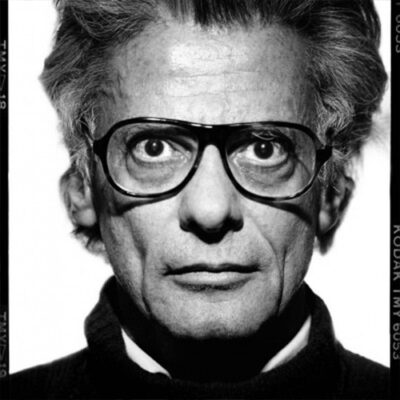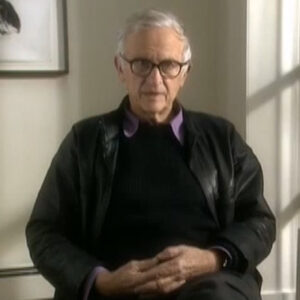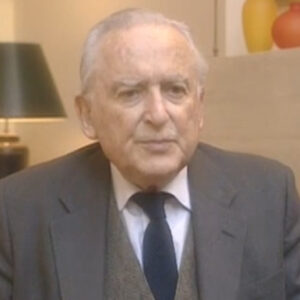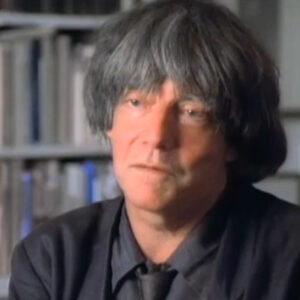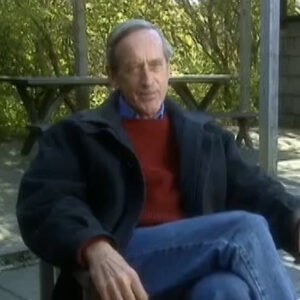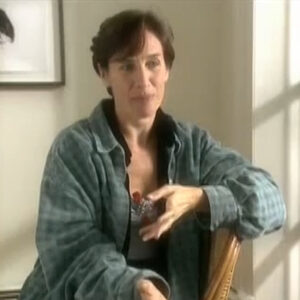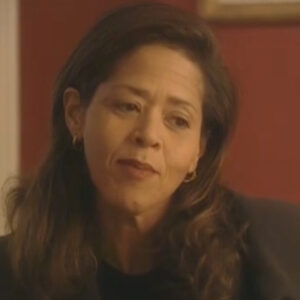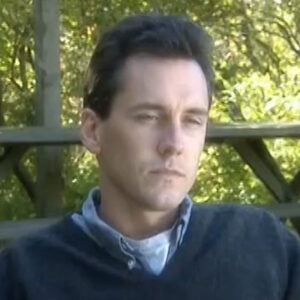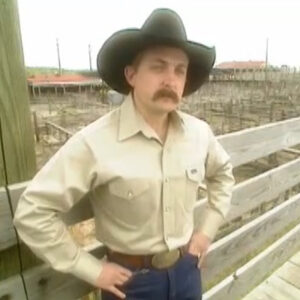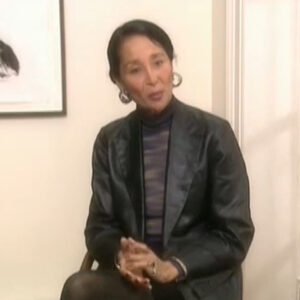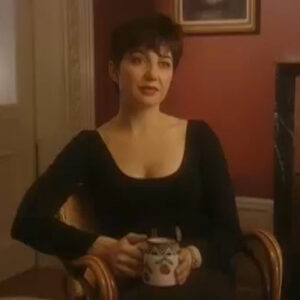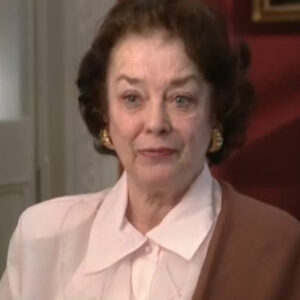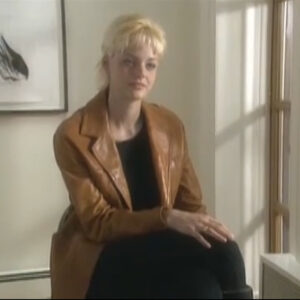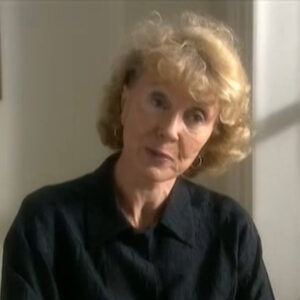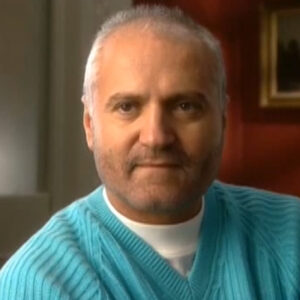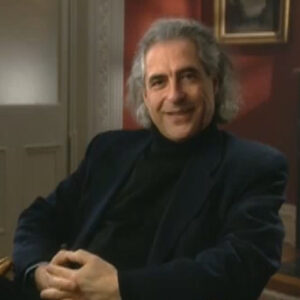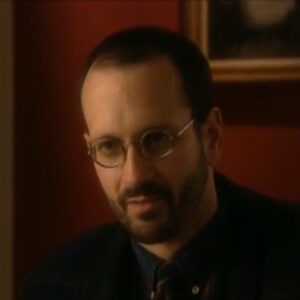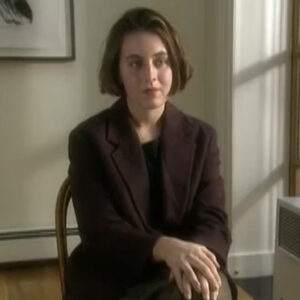Speaker The the thing that hits me about his work, both just of so-called ordinary people and of people who are celebrities.
Speaker Well, all right.
Speaker When you see a great performance of acting, whether it’s in the theater or whether it’s in the film. It moves. It’s certainly specific. But it like I can only describe it. It moves through the specific, beyond the specific, into the essential. If you know what I mean, that there’s behavior, of course, has to be absolutely specific. That is the essence of somebody, the essence of a person, the essence of a character. He captures this. He has a girl who’s here at a cafe in Paris at a at a sidewalk cafe. August 4th, 1948. Her name’s Elise. She’s a model. She sits like this and it’s her eyes. Now, one of the acting teachers I had when I was trying to learn how to act was Robert Lewis. Bobby Lewis, as he’s known. And there was an exercise exercise he had in his class, which I occasionally teach in mine, where he would ask you to find a portrait that had been painted like in the 15th century, 18th centuries, and just to find a portrait. And to be getting the exercise in the pose of the portrait and then to move from that and create the next three minutes of the person’s life. Now, of course, it helped you. I think I picked a Hogarth of a real fat man. I put stuff in me to get fat. And he was obviously, you know, fat and slack jawed and corrupt. And I just began from that. And then I and out of that became a whole became everything behavior, a history, a personal history, a way of speaking, a voice, the placement of the voice and everything. And this whole kind of life got created, which was an inner life. It wasn’t just an image. Now, for that to be able to work in the exercise that we had in Bobby’s class. The portrait itself had to be incredibly evocative and alive. You couldn’t just take one of those ordinary portraits that hangs on a wall and do it. It wouldn’t suggest anything to you.
Speaker If I were going to play any one of these parts in the evident pictures, like a lease apart, I do not think I would be cast in or are on a oniony.
Speaker Whereas she laughs at the camera, but it’s a whole way, she laughs, she laughs in a way that confronts the camera. She confronts the person at whom she’s loud. I mean, she confronts the person with whom she’s laughing. She confronts them with her own appetite. So you so you instantly move beyond the idea of an Italian lady laughing, you know, into there’s like a verb connected with it that then begins to be like the verb, which. I mean, I just pick the verb to confront confront someone with your laughter. And if you if you were going to play an exercise of onem on Yonnet or the role of an onion and you began with this picture, you could then create the next three minutes of what she would say to him. It’s like they’re planning an evening out and she’s she’s finding something that the man she’s just that she’s speaking to, she’s found something he’s just said amusing. And she confronts him with how amused she is. And so she goes from there. She doesn’t just relax and take in the humor she confronts with her response and. People say is in people say in enacting do you work from the outside in or do you work from the inside? Well, any actor that is worth watching. Does the two things at the same time. I mean, simultaneously, they just do. So somebody says how? And then.
Speaker And the answer that question is years from years of experience.
Speaker There’s no I mean, it’s just the two things have to happen at the same time where it just isn’t interesting to just completely go from the outside. It can be a little mechanical. And to go from the inside out can become self-indulgent and all those awful things. But the great actors are even the very good actors. They do that. They do it at the same time. Now, these pictures would find a key to how to do that if you were playing any one of these parts. Because he captures a moment in each of these people that is so defined. So defined so is let’s the outside in. But at the same time, it’s defined by. He captures something of what they’re of what they’re doing. It’s not just an attitude. He kept is what the person how they’re confronting the world of or re or taking on the world, which, of course, comes from the inside out. And so you get the two things at the same time. I hope this is going, Aaron. It’s very hard to put into words.
Speaker Oh, now here’s the duke and Duchess of Windsor. You see? This man looks so frightened. I can’t begin to tell you. He looks to me, he’s looking at the camera. He’s saying, don’t take anything more away from me, please.
Speaker And I think I’m I’m sure I would know that from the picture, even if for some reason I didn’t know anything of the history, I would say here’s a do. Here’s a Duke who seems very frightened of the camera. He’s very frightened of being seen. And therefore, his response to the actor being seen as a plea to not be seen anymore. Again, it’s a verb. Well, please amount. But you get what?
Speaker And then there’s his his his wife.
Speaker Who looks like she’s trying to still keep it up? She’s still trying to present an elegant. Face to the world.
Speaker She’s still trying to pretend that everything. No, she’s not trying to pretend everything’s okay. She’s way past that, but she’s still trying to say that there’s such a thing as as dignity. There’s such a thing as. Past that. He’s just saying, let me alone, please, let me alone. Now, I don’t know anything about the photographer’s art. I don’t know how you get that from the duke and Duchess of Windsor, but as an actor, it’s that that you have to get. And then all the different actions that the playwright or the author of the film or the director the film wants to wants to get from you. Are all variations on.
Speaker The verb, whatever the verb of the character is. But the verb. It’s the noun. I’m going to use words that make this process sound too deliberate and too thought out. But the selection of the verb.
Speaker And the word selection is wrong, it’s too cerebral. But the way the verb is arrived at. I mean, the really the really great actors. They probably go. They do. And perhaps they don’t even they don’t even use words in their head. But they but in effect, what they do is they I mean, a great actor will go through 80 verbs before they before they come upon. The right one, he seems to do the same thing as a photographer. He captures something essential about the way these people take on the world. And the way a person takes on the world, whether they’re eight years old or eight years old, tells you everything about them. It goes beyond biography. It goes beyond something that is only specific. I mean, it has to be specific before it’s anything else. But all. But all. But all. But a lot of actors get to the specific and there they remain. They don’t go any further than that. They don’t go to the essential thing. And that’s the finding of the right versions. His pictures are just.
Speaker Oh, Dorothy Parker.
Speaker What is she saying to the camera? First of all, she’s saying I’m drunk. I mean, clearly. Then she’s saying, I’m drunk. But I know a lot.
Speaker And she’s saying, I’m drunk, but I know a lot and I’m not sure I’m going to tell you or if I tell you, I’m going to funnel it through such a specific way of saying in such a sense guilty that you that I will protect from you the pain that it’s coming from. I parcel it out exactly the way I want. I mean, the wit is going to get.
Speaker It’s going to give my pain to you on completely on my terms. See all of this I get from this picture. If I saw a different kind of picture of Dorothy Parker, I’d see something else. But here’s what I see. And then it makes me I mean, if I were in that film that they now have. But if I were playing her. I haven’t seen that film. That wonderful actress is playing her eye. This picture would be a great thing to start from. Bet she did. I’ll bet that somewhere in Jennifer Jason Leigh’s work on that part was this picture. I mean, I don’t know. I wouldn’t be surprised.
Speaker And he does this.
Speaker Does this all the time.
Speaker Here’s a Veronica. Compton, a model with a horse.
Speaker And she’s making a talk. And she’s making an expression at the dog and the dog is making and making a face back at her. And she loves the dog, which she’s.
Speaker Asserting herself against the dog. I mean, not against the dog, but. She’s she’s claiming a kind of animal equality with the dog, you know?
Speaker And you just you see that and I mean, oh, Bobby Clark in what appears to be.
Speaker A dressing room or something like that.
Speaker There’s one in hero Odden. Which he what I get the feeling is it is the end of a day’s work. Now, who knows what it was, but it looks like he’d been in this room and he’d been writing poetry for however long he did at a given stretch, a few hours.
Speaker And he’s smoking. He’s look. He seems to be kind of looking at the smoke from his from his cigarette or through the smoke and or at the smoke all at the same time.
Speaker And he has this incredible weariness in his face that comes from that kind of work that he’s been doing. I would think where his where his nerves are fried and his soul is fried and he’s trying to get back into.
Speaker I mean, you know how it is after you’ve written because you write and I write and probably a lot of us. You write, but you. If you’ve written for hours, particularly if it’s gone at all, well, and by well, I just mean that actual words appear. It’s you. And you’re through at the end of a few hours or whatever. There’s that little period of trying to adjust again to the real world. Because you’ve been in some other tunnel, you’ve been in some other place all that time now, I’d imagine if you were Odden, you wrote the kind of things that he wrote and that that reentry period. And this was also obviously taken when he was an older man.
Speaker And and so he was exhausted.
Speaker He’d been doing this for a lifetime. So he’s looking at this smoke and he has a very he’s just specifically focused on it. You if you were playing the part of Odden, which is kind of exciting, actually, but if you were, you would think if you look at this picture, I wouldn’t even have to be seeing anything specific in the smoke. I’m just looking at the smoke. The act of looking at the smoke after you’ve been composing poetry for hours, maybe hadn’t been. That’s what it looks like.
Speaker And because it’s odd and of course, you fill those things in. But just the act of looking at the smoke.
Speaker Is very it’s going to slowly re-enter you back into the harder surfaces of reality that you can then kind of cope with them.
Speaker And and if you look at the smoke or kind of expression on your face, what happened? Like it’s on his. Which would then. Now, if you get I mean, this is so weird to say it this way. I mean, this isn’t the way it’s supposed to work as an actor. But the fact is that if you get a certain expression on your face as an actor, the right expression.
Speaker A whole host of inter associations begin to flow from it. Now, that doesn’t mean that doesn’t mean you go around and try to get the right expression on your face. But somehow if you see a picture of it or if you imagine it in your mind’s eye. But if you see a picture of it like in here and this was true of the Bobby Lewis exercise, too, you had to get the right expression. But when that when the expression that you’ve been had you begin with has been has been found by an artist like Avidan or like Hogarth or whoever, you’re ahead of the game.
Speaker Because that artist or photographer has searched and searched and searched for that, and he’s and he’s probably taken a lot of pictures or he’s easy. He hasn’t taken a lot of pictures, but he’s looked and looked. And then he found it and he shot it. And the true artist is impatient with anything that isn’t essential. That isn’t of the essence of the thing being portrayed. And so if you’re playing Odden and you work from that from the from the Odden photograph of evidence.
Speaker That could leap you right into the heart of a place to place in the inner life to begin from just looking at that smoke without expression on his face.
Speaker And you can move from that into his relationship, to his own creativity and his relationship with your player, Phil about iron would probably be about his relationship to what is called the outside world and and whatever his primary relationships are in the piece.
Speaker And you would be playing and you’d be miles ahead.
Speaker Oh, yeah, yeah, I just I just passed that well.
Speaker Oh, okay. Dick Hickox expression.
Speaker I mean, I wouldn’t have to know about in cold blood or that poor family.
Speaker To know this guy the way he sets his lips.
Speaker A person sets their lips, you know, after a while, they do it reflexively. But that’s a choice. These lips were not like this when he was born.
Speaker This is a way of taking on reality slips are very set and closed and the eyes look out from behind the lips almost. Now here’s Bert La. And he’s playing Estragon part. I’ve played twice. The next time I play it, I’m going to look at this picture.
Speaker It says everything about Estragon in Waiting for Godot. It says everything about Burt LA says everything about being a clown, which is, I don’t know, like he’s playing his hands. He’s pleading for something. He’s pleading that the world find him funny. But also as Estragon, he’s just pleading for a carrot.
Speaker You know?
Speaker And Beckett says in that play that that’s one thing that mankind is doing is pleading for a carrot.
Speaker You know, and not in the hungry sense, but just a moment of pleasure, of of sensual pleasure comes from the simplest things. And it’s just so little to ask.
Speaker And that’s in burglar’s face and certainly in the way his hands are classed, as far as I can see. Coco Chanel. Wow.
Speaker Was a picture the.
Speaker Well, I’m sure she did. It’s not exactly flattering in the conventional sense, but in a profound sense, it’s extremely flattering. I mean, it’s it’s. That’s.
Speaker Inquiring lady who’s very tough and shrewd, but completely inquiring.
Speaker Which is, you know, a wonderful thing to say about somebody, but it’s not like. She’s not in this picture very pretty.
Speaker So I’m sure she hated it, I hate pictures. I’m not privy to. But.
Speaker What does Italian Street say? I think they.
Speaker Yes, I do love those.
Speaker They’re. They’re like in in Palermo.
Speaker And they are swimming and.
Speaker That little kid who’s doing the salute, an entire remote Sicily. September 3rd, 1947, and he’s in some kind of uniform. And this, of course, is only two years after the war ended. And he’s doing a salute. But he has an expression on his face that’s so beyond his years. It’s like he’s kind of whoever he’s looking at. He’s this act of salute is making him. This is a kid. He can’t be more than eight. The active saluting is making him look virtually ironic and sad. So you start to develop from that. A kid that means during the war, he was three, four or five. In Italy, this is during the war.
Speaker And. So.
Speaker A kid, a little boy making a salute is usually not this moment.
Speaker It’s a whole other moment. And.
Speaker So you could begin with that and you could start to develop from that host of associations of what it would feel like to be a child in Italy during World War Two.
Speaker Yeah, the ones that are the ones, the street ones, the Zasa ones sitting there that you found so theatrical.
Speaker Who desousa ones. Zasa. Oh, is this a woman who is.
Speaker Oh, yes, here she is. Here she is.
Speaker Oh, she’s wonderful. I don’t remember her from before.
Speaker Street performer Zazi.
Speaker Oh, yeah.
Speaker I am exactly what to say about that. They’re they’re incredibly.
Speaker She. She’s always interacting with another person.
Speaker And she seems to have a way in each of these pictures of performing with the other person in such a way that releases something very innocent in the other person.
Speaker Even though some of these people are older people and.
Speaker I guess that’s one of the things a performer can really do. A performer like she is. She. She postures with each of these people that she’s involved in these different pictures in a way that releases their sense of.
Speaker Pleasure of having fun, fun. Their sense of fun.
Speaker Is there any role that she can play? You’re thinking about playing in which one of these images could be a peaceful.
Speaker Actually, the odd thing is you could take a take a role that isn’t at all like one of these people and begin with one of these pictures because they’re so these pictures get down underneath into more kind of universal. Things and you could play a part that’s like the opposite of one of these pictures and say, you know, I bet underneath this guy’s like this. And you could build up this whole kind of life. This whole host of behaviors and behavior, isms and and associations, inner associations that would be all based on the picture in the book. And then having developed those just over the top of them, put the behavior of the written character, which was perhaps they’d been almost the opposite. And then you’d have this wonderfully complex thing, because the things he reveals in people are so of the essence. That they would be true to a certain degree of almost anybody.
Speaker Fear is his inspiration for the painting. Really? That’s well.
Speaker Carlos, what do you remember and the great performances in theory, remember a gesture.
Speaker You know.
Speaker If you mean like when the Lonsdorf with Peter Brook, they would just work and work and work and work and work until they found the gesture. The scene. And you find those from a deep kind of Youngie and pool. You know, and then they have to be absolutely specific to the moment in the play. But that’s where you find them and that’s what he.
Speaker Well, he deals with. There was a moment that Tim.
Speaker That Jessica Lange had in street training desire, a moment where we’re right at the very end of the play where she confronted. Where she looked at the man from the sign moments, she realized where he was from and she and the way I mean, I’ve seen brilliant actresses play this role, but in this moment, the way what she fallick member of the attitude of her of her body, she found the moment when somebody suddenly. Seize there. You can’t put it in except in the most grandiose way, seize their fate. And it was, of course, very emotionally full and had been elaborately prepared for all evening. But what you remember is the gesture of that moment. It was like an Abbadon photograph. And I will have it with me. And as long as I’m alive.
Speaker Yes, interesting, a fascist we interviewed said. What is the single?
Speaker Yeah, well, the one yesterday and dark and dark is that you’re really onto something. Once again, let me give you.
Speaker Well, just the way the gestures, people do reflect their whole their whole lives up until that point that they reflect away the person has has found to confront the world. And the gestures, of course, the most revealing when they’re inappropriate because that they’re utterly specific to the person and are not to the event, they’re the person’s particular relationship to the event, but to but to to come on and to come up, come across that one. And it’s just endless trial and error. And when you find it, it’s usually almost unconscious.
Speaker It’s not like you think, Oh.
Speaker I think at this I’ll do that. I mean I mean, anything you come up in that way is usually pretty valueless. But when he’s just arrived at through an immersion, just like these people are, of course, have that immersion and they’re all immersed in their own lives and out of that. And, you know, and then you walk down the street, everyone you see has a different way of walking, has a different way of moving through the world.
Speaker You know, and, oh, like like Odden here with a cigarette. With the way the hand is placed and the way he’s looking at the smoke gathers the modern picture. And. Evelin Franklin.
Speaker The way that she sits there behind the desk and the things she’s looking at, the way she holds her hand and the way she composes herself around what she’s looking at, this is his second wife, I guess.
Speaker It’s.
Speaker Not to put you on the spot. The last question is there is there a picture there that could inspire you, as your Hogarth’s did?
Speaker What would you do one right now? No, I. I not at all. I couldn’t do that. And you know why? Because I had to sit with that Hogarth for hours. I mean, I could what I could do is I is I is I could imitate the gesture, but that would that would defeat everything I’ve just been saying to you, because it would just begin as a completely, completely superficial etching and then it has to like, seep into, you know. No, no idea. Even if it were, I’d have to really sit. It’s like when you read a play, I mean, if you if you’ve known a play all your life, but then you go to to play it, to rehearse it.
Speaker A whole immersion process has to be you. And even if it’s things that you’ve known all your life.

